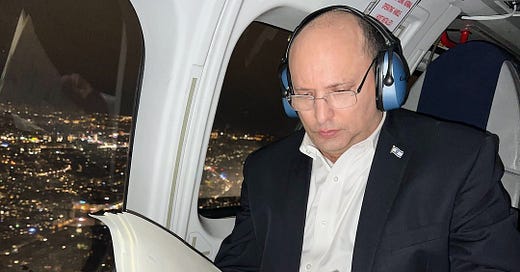Bennett visits Putin
Shuttle diplomacy with multiple layers illustrate the extraordinary times we now live in
When I wake up I always grab my phone, not the best habit I know, but ever since Covid started it has become the first thing to do in the morning. What happened overnight, any news from the other timezones I need to know before the day gets going?
The pandemic has now retreated and given the stage to the war in Ukraine. Yesterday the very first tweet I saw was that Israels’ prime minister Naftali Bennett was on his way to Moscow. Of course quite the spectacular move in this crazy week were all contacts with Putin were rapidly being severed. What was even more notable was that the orthodox Bennett was breaking Shabbat, something that can only be done in the rarest of circumstances. Bennett once got stuck in Washington when a meeting with Biden was delayed and with Shabbat commencing he could not travel. He could this weekend and he thus invoked ‘pikuach nefesh’, the principle in Jewish law that saving or preserving human life overrides any religious rule.
Although supportive of Ukraine, ever since the start of the war Israel has been under a critical eye for not making a drastic break with Putin. To more seasoned observers it was clear that Israel has more than a few reasons to stay close to the Kremlin, while at the same time Ukrainian president Zelensky had been advocating that Bennett act as a mediator. Once he was done in Moscow he flew straight to Berlin to meet up and brief Germany’s new chancellor Olaf Scholz. Shuttle diplomacy we used to call this, and Bennett’s agenda must have been long. Here’s a few things to consider:
Ukraine. Of course it is likely that the meat of the agenda in Moscow would be trying to find a way out of the mess in Ukraine. This would involve not only talks over a ceasefire, but would also include discussions around humanitarian aid. It should be noted that Bennett’s translator in the three-hour long Putin talk was his minister for housing, Ze'ev Elkin, who was actually born in Kharkiv, Ukraine and whose brother still lives there. Israel has been closely monitoring the situation of the many Jews living in Ukraine, a group that if you include dependents is estimated at around 200,000 people.
Syria. The brutal tactics used by Putin’s forces in the Ukraine were honed in the civil war in Syria, and Assad won his bloody civil war thanks largely to Russian help. At the same time Syria is closely aligned with Iran and has supported numerous attacks on Israel using its territory as a staging ground. Israeli retaliation on Syrian soil is rumoured to be only possible once the Kremlin has given the nod or in close consultation with Russians so Israel can avoid creating collateral damage. So Israel needs to remain on good terms with Russia in order to manage the precarious security situation on its northern border. Note the duplicitous role of Putin here, helping Assad win his brutal war, looking the other way if Israel knocks out a few military targets belonging to the same Assad.
Iran. As we speak the negotiations on a new nuclear treaty are still underway in Vienna to revive the nuclear deal that Trump put in the shredder a few years ago. It appears some sort of an agreement is within reach. If you think of what Russia is to Ukraine, then that is Iran to Israel. The mullah’s regime wastes no opportunity to threaten the annihilation of Israel and it is a core piece of Bennett’s foreign agenda to ensure that no nuclear deal with Iran is resurrected as any deal is likely to be disadvantageous to Israel. Keep crippling Iran with sanctions and no deal is where Bennett stands, but it looks like team Biden is taking a different direction. Since the Russians are also at the table in Vienna they will have a say in where the final deal will end up.
Israel. Apart from all of these geopolitical considerations, there are some 1.5 million Israelis with a Russian background and they are a politically potent contingent. Bennett’s current coalition depends to some extent on support from voters of Russian origin and he simply cannot ignore their sentiments when dealing with this crisis.
And finally, America. However different we think Trump and Biden are, they have both been tuning into the more isolationist stance of Americans. The costly misadventures in Afghanistan and Iraq have animated the superpower to be way more careful about international engagements. The US is taking a step back and may be less engaged on Israel’s behalf than at any time in recent history. A possible Iran deal is evidence of that, but so is letting Europe taking more of a lead in its own defence. Israel needs to cultivate relations with major powers if global alignments shift and having access to Chinese and Russian leaders are an essential piece of foreign policy for every Israeli leader, now more than ever.
We don’t know if they sat at the now infamous long table and we can only guess what exactly Naftali and Vlad discussed when they were together yesterday. But it is clear that there was more than one topic on the table where the parties have different and contradicting, but sometimes also overlapping agendas.
Germany under Hitler murdered six million Jews, Russia under Stalin was one of the most anti-Semitic regimes that did everything in its power to make life difficult for Jews. I may have sounded somewhat pessimistic over the past week, but if an orthodox Jew is shuttling between Moscow and Berlin on Shabbat we have made some phenomenal progress in this world. The outcomes aren’t clear yet and they may not come fast enough for the suffering Ukrainian nation, but things are moving.



